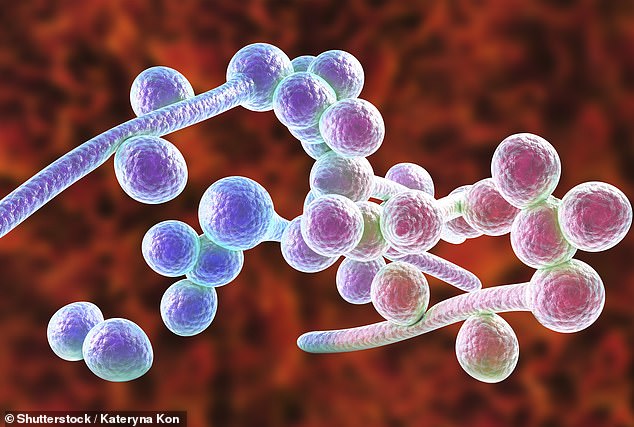A vaccine in development could protect against incurable and hard-to-treat fungal infections that strike nearly 1billion people worldwide and kill 1.5million people every year.
Many of these infections are also increasingly becoming resistant to antibiotics and antifungal treatments, making them nearly impossible to treat.
In a new study, researchers at the University of Georgia have found that their experimental vaccine prevented or reduced the severity of Candida albicans, a multidrug-resistant fungus that causes up to 95 percent of yeast infections.
Candida albicans is the fungus behind vaginal yeast infections, which affect three in four women at least once in their lives, and it leads to itching, burning, redness, burning and pain around the vagina.
The shot, dubbed NXT-2, was shown to ‘generate a robust immune response’ and form antibodies in female mice yeast infections, reducing their fungus levels by 50 percent.
The findings build on the team’s previous studies, which have shown NXT-2 can protect against Candida, as well as Pneumocystis and Aspergillus.
The three groups of fungi are thought to be responsible for more than 80 percent of fatal fungal infections, including severe forms of pneumonia.

Researchers at the University of Georgia are developing a vaccine to treat fungal infections like yeast infections, which affects three in four US women (stock image)
Now, the team is planning to test the vaccine in women with recurrent yeast infections, also known as recurrent vulvovaginal candidiasis (RVVC). It’s thought to affect one in 10 women in their lifetime and cause at least three or more yeast infections every year.
Currently, treatment relies on just one class of drug, which increases the risk that the infection will develop resistance and be harder to treat. These drugs also cannot be used during pregnancy and do not prevent future infections.
Karen Norris, lead study author and professor of immunology and translational biomedicine in the UGA College of Veterinary Medicine, said: ‘RVVC is not life-threatening, but it is miserable.
‘This is a huge need.’
Norris noted that the findings of these clinical trials could inform future research relating to more vulnerable populations, such as transplant recipients and cancer patients, who are at risk of life-threatening fungi that cause pneumonia, sepsis and infections in the central nervous system.
Norris said: ‘I’ve had a physician say to me, “I have patients that I get through stem cell transplants for their cancer treatment, and then they get [the fungus] aspergillosis. I often don’t have adequate treatment for that.”
‘That’s where I believe this vaccine will do the most good: in people who are at high risk for highly dangerous, life-threatening infections.’
The team’s research, published in June in the journal NPJ Vaccines, tested the NXT-2 vaccine on female mice that had been infected with vulvovaginal candidiasis, or a vaginal yeast infection.

Candida albicans, which causes yeast infections, is pictured above (stock image)
The vaccine works by triggering the production of antibodies that work against NXT-2, a protein that helps export RNA and proteins. The antibodies bind to the surface of fungal pathogens and destroy fungal cells.
One group of mice were given the real vaccine while the other group received a placebo.
The team found 28 days after a single dose of the shot, vaccinated mice had 50 percent less fungi present in their vaginal fluid than mice who had the placebo.
Vaccinated mice also had 35 percent less inflammation in their vaginal tissue compared to the unvaccinated group.
The team’s previous research found the vaccine also reduced levels of Pneumocystis and Aspergillus fungi. Pneumocystis leads to Pneumocystis pneumonia, which generally affects those with weakened immune systems and leads to shortness of breath, fever, fatigue, chest pain and dry cough.
Aspergillus causes the infection Aspergillosis, which can invade the lungs and sinuses and cause internal bleeding.
The researchers wrote: ‘These studies provide supportive evidence of broad efficacy of NXT-2 and support the rationale for its further development as a single, pan-fungal vaccine for local and systemic fungal infections.’











